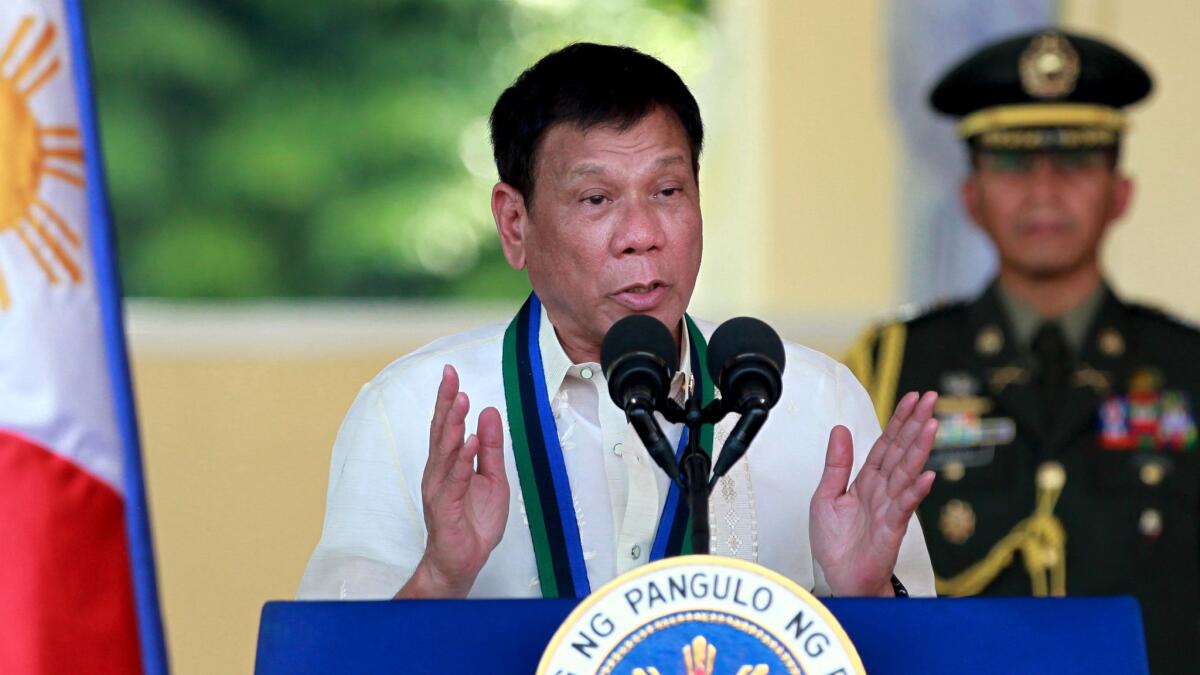Dozens of Philippine officials turn themselves in after president publicly accuses them of drug ties

Dozens of government officials in the Philippines have surrendered to police after the country’s newly inaugurated president publicly linked them to illegal drugs.
In a televised speech on Sunday, President Rodrigo Duterte, speaking in the southern city of Davao, named 150 officials that he said were involved in the country’s drug trade, including members of congress, police officials, five retired and current generals and at least seven judges, and gave them a 24-hour deadline to surrender to police. Several have turned themselves in, including 18 mayors and 31 police officials, according to police statistics.
There is no due process in my mouth.
— Philippine President Rodrigo Duterte
‚ÄúThere is no due process in my mouth,‚ÄĚ Duterte said. ‚ÄúYou can‚Äôt stop me, and I‚Äôm not afraid even if you say that I can end up in jail.‚ÄĚ
For the accused, the stakes are high. Duterte, who took office on June 30, has pledged to rid the country of crime within six months by assassinating thousands of suspected criminals ‚ÄĒ or at least authorizing the police, military, and others to kill them on his behalf.
Since then, at least 564 people have been killed, according to the Philippine Inquirer‚Äôs ‚ÄúKill List,‚ÄĚ a comprehensive resource on the drug war‚Äôs death toll. Some were killed by vigilantes, others by military and police. Many were found next to signs reading ‚Äúpusher‚ÄĚ or ‚ÄúI am a drug addict,‚ÄĚ their heads wrapped in tape.
Despite its brutality, the crackdown has been enormously popular in the Philippines, which has struggled with endemic drug use for decades. Yet human rights groups, foreign governments, other Filipino politicians and church leaders have cautioned that it could undermine the country’s democratic systems.
See the most-read stories in World News this hour ¬Ľ
‚ÄúExtrajudicial killings are not uncommon in the Philippines ‚ÄĒ they happen in Manila and other places across the country,‚ÄĚ said one Filipino human rights worker who requested anonymity, citing concerns about his personal safety. ‚ÄúThis is unprecedented because of the [coordinated] policy, and because the sheer number of people being killed is just enormous ‚Ķ we now have a total breakdown in regard for due process, it‚Äôs a massive violation of civil liberties.‚ÄĚ
‚Äú[Duterte] is probably the most popular president we‚Äôve ever had,‚ÄĚ he said, adding that the leader may be more widely revered than Corazon Aquino, who restored democracy to the country in 1986 after 20 years of President Ferdinand Marcos‚Äô authoritarian rule. ‚ÄúI‚Äôve been watching this issue [for years] and I‚Äôve never seen this kind of support for something so horrible from a human rights perspective.‚ÄĚ
On Monday, Elizabeth Trudeau, a U.S. State Department spokeswoman, said that Washington is ‚Äúconcerned‚ÄĚ about the extrajudicial killings. ‚ÄúWe believe in rule of law. We believe in due process. We believe in respect for universal human rights,‚ÄĚ she told reporters.
Duterte‚Äôs blacklist offered no evidence, according to local media. Several names were incomplete, and at least one of the accused ‚ÄĒ a judge ‚ÄĒ was later discovered to be long dead.
Several blacklisted officials have responded to Duterte’s accusations by defending themselves, while also voicing support for his initiatives.
I’ve never seen this kind of support for something so horrible from a human rights perspective.
— Filipino human rights worker
One of them, former Cebu City Mayor Mike Rama, posted his defense to Facebook. ‚ÄúEven how untrue this accusation is, should this be the way and the necessary step to win the war against drugs, I will fully cooperate with the authorities to immediately clear my name and we trust that we will be given the opportunity to present our side and prove our innocence,‚ÄĚ he wrote. ‚ÄúMy unwavering support for President Duterte‚Äôs campaign will continue.‚ÄĚ
Duterte defended his blacklist to reporters Tuesday. ‚ÄúMy words [are] not accusatorial, it is not a criminal information,‚ÄĚ he said. ‚ÄúIt‚Äôs just my word against the others, because I have the duty to tell the public.‚ÄĚ
The police have expressed uncertainty about how to manage the wave of surrenders. ‚ÄúIt is true [that there is not enough evidence against them],‚ÄĚ said Philippine National Police Chief Ronald dela Rosa, according to CNN. ‚ÄúBut what can I do? The president named them and they came to me and surrendered. I can‚Äôt just turn them away‚Ķ. So now that they‚Äôre here, we‚Äôll process them.‚ÄĚ
‚Äú[The list] is not based on rumors or gossip. It didn‚Äôt come from people whispering to the president‚Äôs ear, ‚ÄėSir, this person is a political opponent, this one didn‚Äôt support you in the election, so include him‚Äô.... The president isn‚Äôt that shallow.‚ÄĚ
One Manila politician, Senate President Aquilino Pimentel Jr., offered a glib comment on the list‚Äôs inclusion of dead officials: ‚ÄúIf the person is dead, then there‚Äôs no need for him to report to his superior,‚ÄĚ he told the Philippine Inquirer. ‚ÄúBut those who are living, you should report to your superiors because that‚Äôs the president‚Äôs suggestion and that‚Äôs the proper thing to do.‚ÄĚ
MORE WORLD NEWS
The world’s newest nation is on the brink of a new civil war
Spy saga comes to a close as Iran executes a nuclear scientist accused of giving info to the U.S.
China racks up 8 medals, and a list of perceived slights, at Rio Olympics
More to Read
Sign up for Essential California
The most important California stories and recommendations in your inbox every morning.
You may occasionally receive promotional content from the Los Angeles Times.










